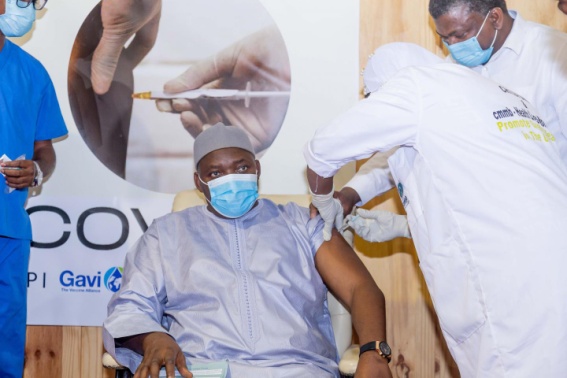
Different theories surrounding covid-19 doses and its side effects are what discourage many from taking the jab.
Despite the severity and threat coronavirus poses to humanity, health experts are advising that the advantages of taking the vaccine dose far outweighs the disadvantages.
In this report, we assess how people are reacting to vaccines and the widely held misconception surrounding it.
Momodou Jawo, is a concerned Gambia, who is yet to take his covid-19 jab. For him, due to the widely held misconceptions surrounding the vaccines, he’s scared to take it.
“Another thing is that people that are supposed to take the lead in taking the jab like (some health personals) are still skeptical about taking the vaccines. Unless and until I am convinced that there are no complications in both vaccines currently being administered in the country, I am not taking the vaccines. Although, I will observe all the necessary safety measures as per with WHO guidelines such as regular hand washing, social distancing, and use of wearing of face masks.”
Jawo like many other Gambians shared similar beliefs with regard to covid-19 vaccines.
Kebba Camara is another concerned Gambia, who has not taken the vaccine. For him, the reason why he is yet to take the jab is the fact that some of his friends and colleagues who were vaccinated complained of side effects.
“Some of them were not able to go to work the following day when they took the jab because they were dizzy. Most of them discourage me from taking it.”
Gibril Gando Baldeh, senior health communications officer, health communication Unit at the Ministry of Health, explained that the most common misconception that is spreading surrounding covid-19 vaccine is that, when one is vaccinated with Covid-19 vaccines, after two years ‘you will die’.
“We have received calls from the public on 1025, with many asking regarding that misconception or rumour. What we can say is that these are rumours that spread basically by people who have no or little knowledge about vaccines and vaccination. The Gambia had been vaccinating its population since 1979 when the Expanded Programme on Immunisation was formed. So basically, that has proven that the misconception that after receiving two years ‘you will die is not true’.
“Since inception of the office responsible for vaccine and vaccination (EPI), we have been introducing many vaccines in the country.”
The Gambia, according to Baldeh, is currently vaccinating against thirteen diseases using vaccines to prevent them, saying these diseases include, yellow fever, meningitis, hepatitis and polio, among others.
“Another misconception is that it will prevent women from getting pregnant or it will interrupt their fertility or even their menstrual cycle. So we are appealing to the public to follow the Ministry of Health and their staff as far as information is concerned regarding the vaccine, specifically public health officers who are on routine immunisation at the health facilities.”
The senior risk communication and community engagement officer thus encouraged all women and girls that the vaccines aresafe for them to use and that it has no interaction with their fertility.
“The vaccine if injected in muscle doesn't go anywhere near a female reproductive health system, so for that being the case, there is no fear or interference with fertility of the women nor their menstrual cycle.”
The vaccines, he added, have been tested by the World Health Organisation (WHO) and proven to be safe for women to use who are above the age of 18.
“Also, pregnant women, lactating mothers, can all still use vaccines as has been proven for them to use.”
Mamanding Kinteh, senior vaccine officer at the Ministry of Health, shared similar sentiments, noting that despite the misinformation surrounding the safety of covid-19 vaccines, the country was about to vaccinate 10% of its population.
With a population of close to two million, the country’s target is to vaccinate over 1.4 million of its population.
“Currently, as of August 31st the country vaccinated over 177,168 people.”
However, what makes the country’s vaccination process a smooth process is that health officials used two implementation strategies namely; fixed and mobile outreach to get to people even those in offices and hard to reach areas.
Out of the total number of people vaccinated, official figures indicated that more women have turn up for vaccination compared to their male counterparts going by total doses of vaccines administered per region by sex.
Myths & misconception
Kinteh explained that since the onset of the vaccination, vaccine safety has been questioned in view of the shorter period these vaccines were produced.
“Many believe that the Covid-19 vaccine causes infertility and that all those vaccinated will die after two years.”
These vaccines, she clarified, are very safe and effective, and that they are the only remedial and solution in fighting the pandemic
She, however, encouraged all those aged 18 and above to get vaccinated so as to protect themselves, their families and loved ones.
“Despite being vaccinated, other preventive measures should be followed. The public was able to prevent meningitis, measles, yellow fever, small pox etc through vaccination.”
Meanwhile, the types of vaccines currently being administered in the country are the Janssen & Janssen, AstraZenca and Sinopharm.
However, with months into the country’s vaccine scheme, change of mindset and approach is a most, if not the country’s quest to vaccinate majority of its population would be far–fetch dream to achieve.
This story was produced with support from Journalists for Human Rights (JHR), through its Mobilising Media in the Fight Against COVID-19 in partnership with Mai-Media and The Point.





